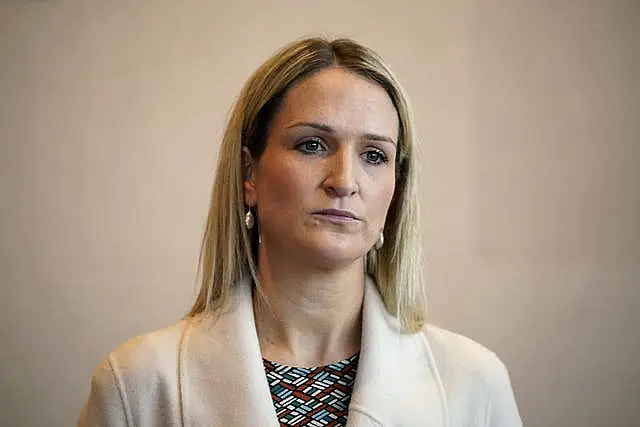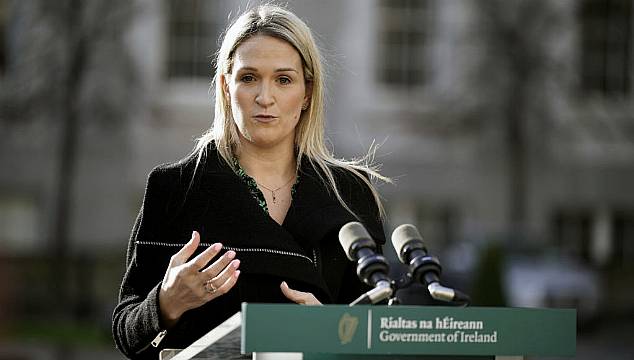Minister for Justice Helen McEntee has said that the addition of Algeria and Botswana to Ireland’s list of “safe countries” is not meant to deter genuine asylum applicants.
Ms McEntee said that the change was to make the international protection process more efficient and to deter people from using Ireland’s asylum system as a route for economic migration.
She said there had been a “sharp increase” in the number of people coming to Ireland from Algeria and said that four out of 10 people who apply for international protection in Ireland are successful.
“The point of this is to make sure that if you’re using the international protection system for economic purposes, you’re not going to be successful,” she said.
“I want those people who are fleeing war, persecution, inhumane treatment in their own country, to be in a system that works efficiently and effectively for them, and if you have six people out of the 10 that are in the system that shouldn’t be there, that’s what I’m trying to deter.
“It should never be used as a back way to economic migration. We have a very efficient visa system.”
The “safe countries” list is part of a process for consideration of asylum applications.
The existing list of safe countries includes Albania, Bosnia and Herzegovina, North Macedonia, Georgia, Montenegro, Kosovo, Serbia, and South Africa.
While asylum seekers may travel from countries deemed safe, there are still cases where applicants can show their personal circumstances mean their country is not safe for them.
Approximately eight in 10 such applications are refused and the total number of applications from safe countries has fallen by 38 per cent since November 2022.
A country is designated as “safe” when there is no persecution, torture, or inhumane or degrading treatment or punishment, and no threat by reason of indiscriminate violence in situations of international or internal armed conflict.
Information to decide whether to designate a country safe is based on information from other EU member states, the European Union Agency for Asylum (EUAA), the UN High Commissioner for Refugees, the Council of Europe and other international organisations as appropriate.

Ms McEntee also confirmed that the Government is considering using chartered flights to “potentially bring a large group of people” to a country or for gardaí to escort “a potentially dangerous person” out of the country.
She said: “This is to make sure we have the options there. This is something that was used previously in this country. It’s a mechanism that’s used in other countries as well. And I think it’s important that we have that option available to us.”
She said her department was engaging with the Department of Enterprise on turning Ireland’s two-stage work visa system to “make that into one system” and to project what Ireland’s employment and economic needs will be in the future.
Ms McEntee said Ireland is not stating that it is “full”, but that Government wants to have the most “efficient and effective” system possible as migration increases globally.
Speaking after Cabinet, Ms McEntee said the work on Ireland’s immigration and asylum system was not in response to what she said were “criminal” attacks on buildings that were earmarked for use by asylum seekers and refugees.
“It is in no way connected to the work that government is doing to make sure that we have an efficient and an effective system that responds to the challenges,” she said.
“We’re in a challenging situation at the moment, I’m not going to deny that. We went from having around 3,000 applications a year of post Covid to closer to 12-13,000. That is reflected right across the EU, right across the globe.
“We need to make sure that we have as efficient and effective system in place as possible to be able to respond to those demands.”
Ms McEntee said the “biggest challenge” with the international protection appeals process involves ensuring that there are enough staff to process applications quickly.
She added: “We went from an international protection team of 206 people, in the last year that’s increased to 408. I have provisions to hire 82 more people this year. So we’ll have more than doubled it by the end of the year, which means we can process from 300 applications a month to 1,000, and that will increase to 1400 a month this year.”
Meanwhile, Minister for Higher Education Simon Harris said that migration and the Government’s migration policy has dominated public discourse in recent weeks and months.
He said conversations were happening in homes and communities around the country.
“Unfortunately, if we’re being honest, a significant amount of that conversation has been grounded in misinformation, disinformation, and often worse than that,” Mr Harris told the Dáil on Tuesday.
“Over that time, we have seen a real coarseness develop and truthfully at times a cruelty entering these discussions and what I mean by that is that we have seen a discourse that has allowed broad brushstrokes being used to label people, human beings who come here, who come to our country seeking protection, seeking help.
“We’ve nearly forgotten the humanity sometimes in the discussion, rather preferring to use labels. That really, really needs to stop because none of it helps, much of it hurts and all of it seeks to divide.”

He also said that communities have the right to ask questions and seek information without being labelled as “extreme”.
Speaking during Dáil statements on co-ordination of services for people seeking protection in Ireland, Sinn Féin’s Matt Carthy said that Ireland needs a migration system that is well managed as well as “fair, effective and enforced”.
He added: “That is Sinn Féin’s objective – not open borders, as some try to portray, and the problem is that Government’s approach is not seen as well managed or fair or efficient, or effective.
“That is particularly the case with international protection emergency accommodation. If Government were purposely setting out to antagonise local communities, they couldn’t have done a better job.
“Communities wake up to find that a local hotel or pub or nursing home or other business has been turned into emergency accommodation.
“There’s no discussion, no engagement, no appraisal whatsoever as to the impact on a community losing out on that business. There’s no interaction with schools, with GPs or other service providers.
“The only consideration is the availability of a building and that’s unfair. It’s unfair on those who are to be accommodated, and it’s unfair on local communities, and the only winners are those private operators that are making huge sums of money.”







